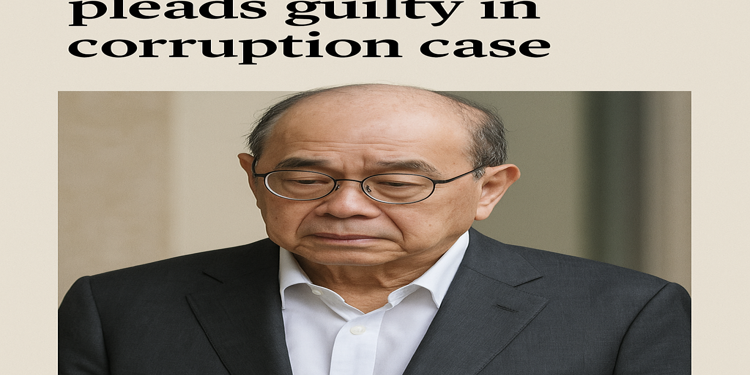**Title: Singapore: Tycoon Ong Beng Seng Pleads Guilty in Corruption Case**
Singapore, a city-state known for its cleanliness, efficiency, and strict laws, has once again captured international attention with a high-profile corruption case involving Ong Beng Seng, a prominent businessman and tycoon. This incident not only raises questions about the integrity of the business environment in the Lion City but also highlights the challenges faced by the government in maintaining its reputation as a corruption-free nation.
### The Background of Ong Beng Seng
Ong Beng Seng is a well-known figure in Singapore’s business landscape, recognized for his role as the managing director of the Singapore-based hotel management company, Hotel Properties Limited (HPL). With a keen eye for investment, he played a significant role in the development and management of some of Singapore’s most luxurious hotels, including the renowned Hilton and Marriott chains.
Over the years, Ong’s success has positioned him among Singapore’s wealthiest individuals. His business acumen and strategic investments in property developments have garnered him not just financial wealth but also significant influence. However, the very success that propelled him to prominence has now turned into a legal quagmire that could shake the foundations of his business empire.
### The Corruption Charges
The allegations against Ong stem from a multi-million dollar corruption investigation that outlines how he engaged in corrupt practices to secure contracts and favorable deals for his businesses. Authorities uncovered evidence suggesting that he paid bribes to government officials to expedite licenses and permits for his hotel projects. It is reported that these unlawful dealings extended over several years, effectively undermining the integrity of Singapore’s business landscape.
In a country where tolerance for corruption is nearly zero, such allegations sent shockwaves through the community and sparked public outrage. Singapore has built a strong reputation for its strict anti-corruption stance, and any deviation from this standard raises alarms among its citizens, business owners, and investors.
### The Plea Deal
After months of legal proceedings, Ong Beng Seng opted to plead guilty to reduced charges as part of a plea deal with prosecutors. In exchange for his cooperation and acceptance of some responsibility, the prosecution agreed to lessen the severity of the charges against him. This decision is not uncommon in high-profile cases where defendants may seek to reduce potential sentencing or mitigate public backlash.
While Ong’s guilty plea suggests accountability, it raises questions about the extent of corruption that may exist beyond his actions. Many are eager to know if there are deeper networks involved, or if he acted alone. The case has opened the floodgates for discussions regarding systemic issues within the regulatory frameworks that govern Singapore’s business operations.
### Public Reactions
The response from the public has been mixed. On one hand, there is a sense of vindication among citizens who demanded punishment for corruption. The successful prosecution of a figure as high-profile as Ong Beng Seng is a strong message that no one is above the law. Singaporean officials have praised the case as a testament to the robustness of their anti-corruption strategies.
Conversely, some individuals are concerned about the broader implications of the case. Critics argue that this incident may tarnish Singapore’s reputation as a premier business hub in Asia. Investors might reconsider their plans when there’s uncertainty about the integrity of business transactions, especially if they fear encountering bureaucratic hurdles in an environment supposedly resistant to corruption.
### Implications for the Business Environment
The Ong Beng Seng case is a landmark event that could reshape the landscape of business in Singapore. While it serves as a reminder of the ongoing need for vigilance against corruption, it may also presage increased scrutiny and regulation of business practices. The Singapore government may come under pressure to reinforce existing anti-corruption measures and enhance transparency in dealings with business entities.
In addition, this case may trigger a wave of internal investigations within various companies. Corporate ethics and compliance programs will likely be revisited, and businesses may seek to ensure they operate above reproach to maintain both public trust and investor confidence.
### Future Steps for Singapore
As the case unfolds, Singaporean authorities will need to grapple with the ramifications of Ong’s actions. The city-state has historically thrived on its image of being a safe and reliable environment for business. Moving forward, the government must work diligently to reassure stakeholders of its commitment to maintaining a fair and corruption-free atmosphere.
Strategies may include the introduction of more stringent regulations, extensive training for public officials on ethical conduct, and increased enforcement of anti-corruption laws. By prioritizing transparency, accountability, and integrity, the government can take proactive measures to sustain public confidence in its institutional frameworks.
### Conclusion
The guilty plea of Ong Beng Seng resonates beyond the individual case; it embodies the broader themes of integrity, accountability, and the continuous fight against corruption. For a nation as proud as Singapore in its achievements in governance and business, this event is not just a legal matter but a pivotal moment that requires reflection and action.
As the legal proceedings continue and more details emerge, the global community watches closely. Singapore’s response will set a precedent on how corruption cases are handled in the region, impacting not only the local business climate but also its reputation on








